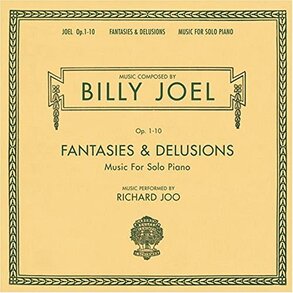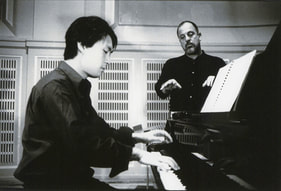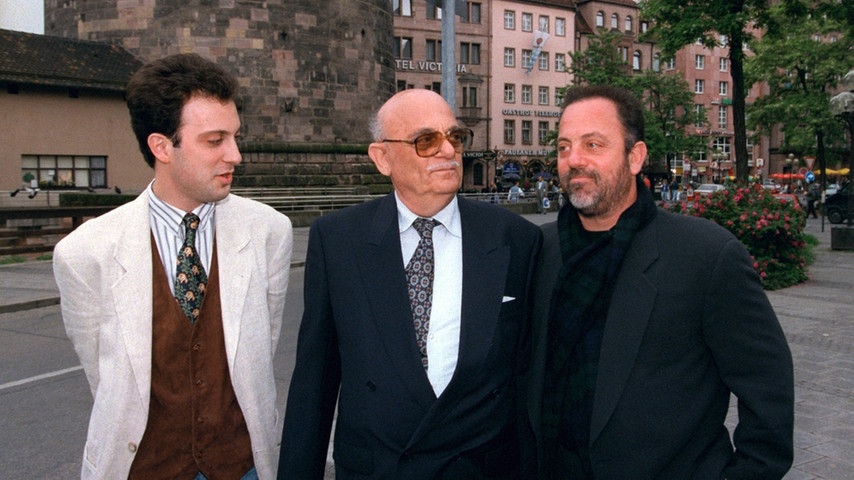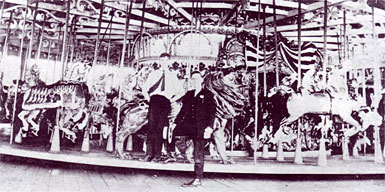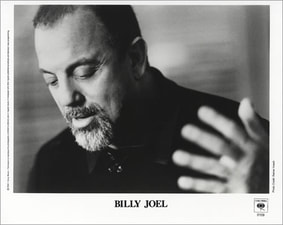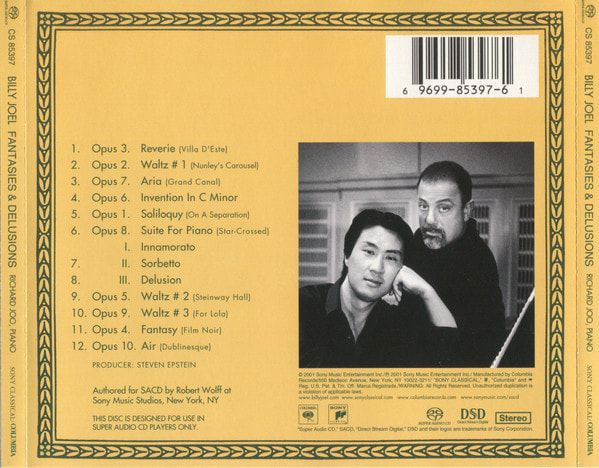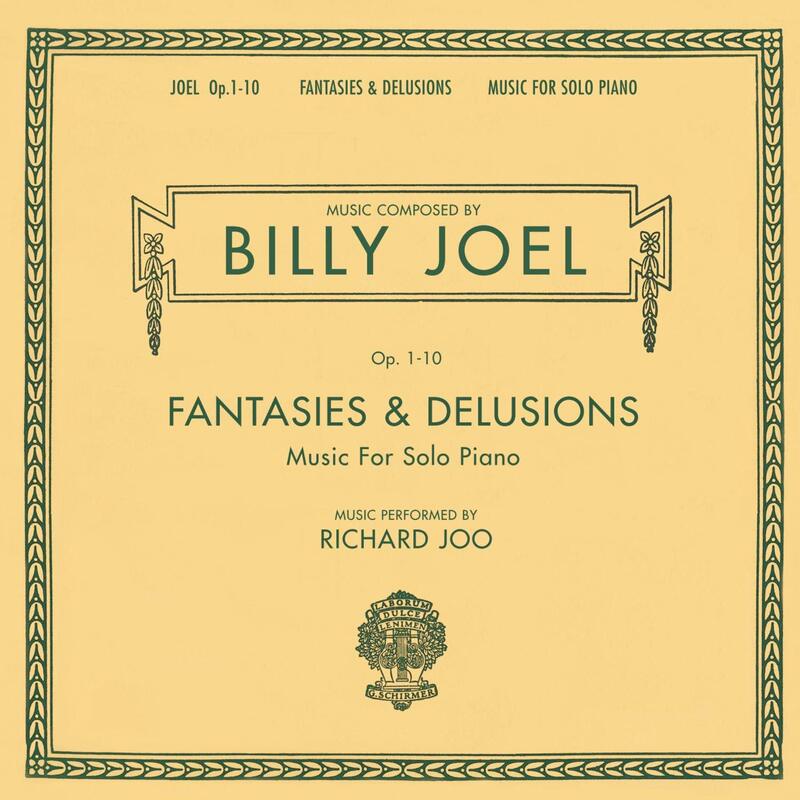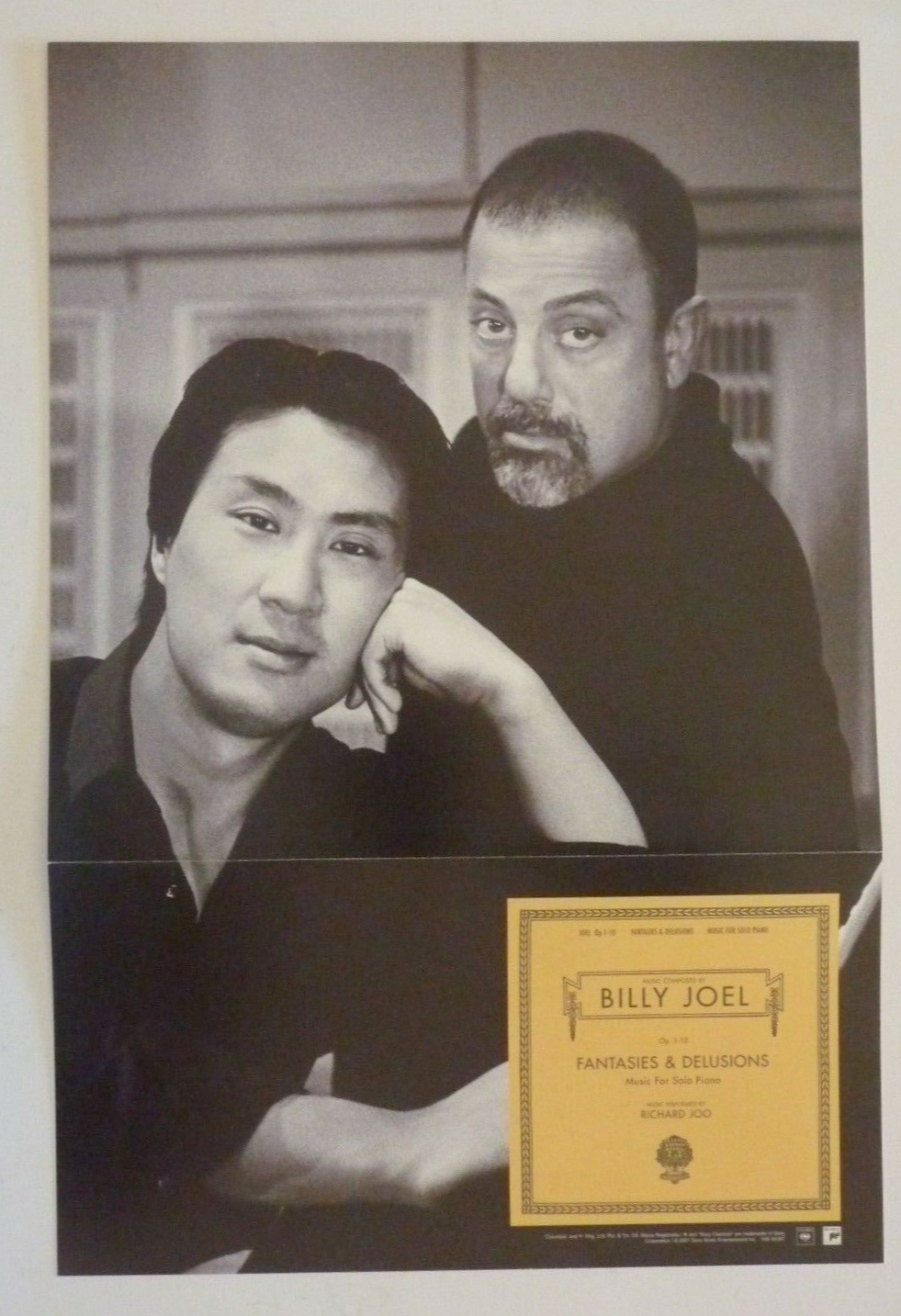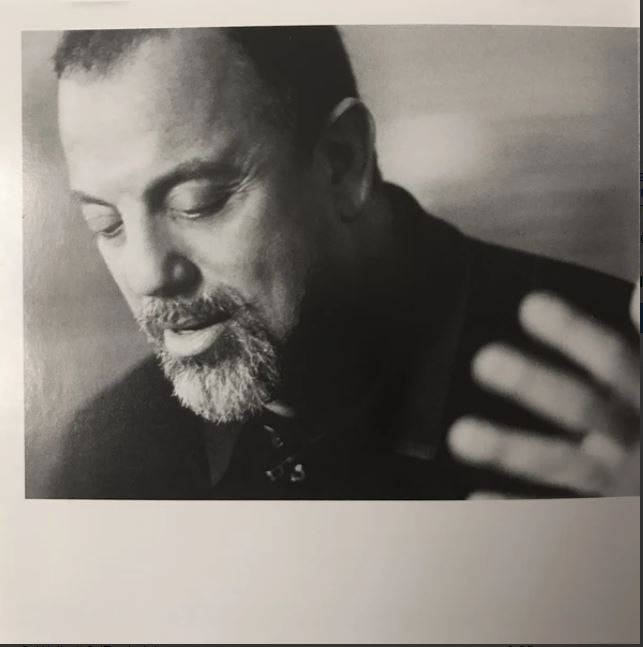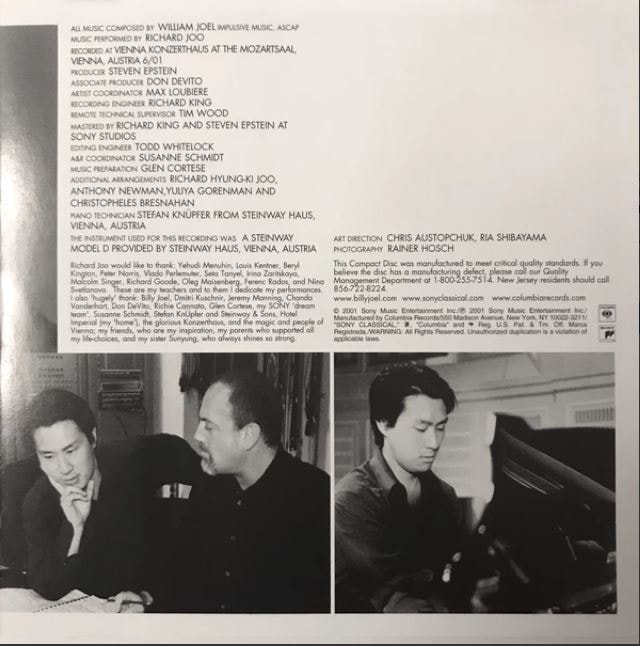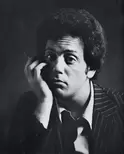|
|
After an eight year hiatus from the studio (other than Greatest Hits III), Billy came back in 2001 with an album of classical compositions, Fantasies & Delusions. Billy had originally been taught classical piano as a child before discovering rock and roll, so he was returning to his roots in some sense. His father Howard Joel was a classical pianist, his mother a talented singer, and Billy's half-brother, Alexander Joel, is a symphony conductor.
I do not know enough about classical music to comment on the album, other than to say this is an enjoyable collection of songs and demonstrates that Billy is truly gifted. I particularly enjoy the last composition, the melodic and melancholy "Air: Dublinesque." Also, the album title and artwork are quite clever, as any classical piano fan or student can tell you, as it mimics the classical music lesson books published by the G. Schirmer Company that are used by many piano teachers and students. Billy did not play the pieces on this album, rather virtuoso classical pianist Richard Joo played the pieces. Billy's brother Alexander had introduced Billy to Joo. Joo and Joel have performed together on occasion. See Videos tab, above. |
|
In a Rolling Stone cover story from 1982 by Chris Connelly, Billy explains that his mother encouraged him to pursue the arts, including classical music, even though the family had limited means:
But after seeing The Beatles perform in their iconic appearance on the Ed Sullivan Show in 1964 (which Billy saw on a neighbor's television), Billy turned to rock and roll music instead. Still, he did compose and record a classical piece, the Chopin-like "Nocturne," on his debut album Cold Spring Harbor in 1971. For the next few decades, Billy became a pop and rock star. But in 1996, Billy expressed his desire to write classical music like Samuel Barber's mournful "Adagio for Strings," foreshadowing his composition of the classical pieces that later became Fantasies & Delusions. Watch this video from 1996 in which Billy explains why he was writing classical music at the time, and performs part of the song. You can also hear "Adagio for Strings" here. Even earlier at a Master Class in 1993, Billy told the audience that if he could live and write music in any era it would have been in the late 19th century when great Romantic composers such as Debussy, Ravel, and Satie were writing. Listen to the Masterclass here (beginning at 22:43 and keep listening for the classical piece Billy wrote and plays).
After Fantasies & Delusions was released in 2001, fans had hoped that Billy would compose and record more classical compositions or film scores, if not pop songs, but the album remains his first and last classical music album. The only other classical pieces he has released are "Nocturne" on 1971's Cold Spring Harbor and "Elegy: The Great Peconic" (performed by members of the London Symphony Orchestra) which is available on My Lives and on Music of Hope. The latter is an album featuring classical and instrumental compositions by Paul McCartney, Billy Joel, Ray Charles, Andre Previn, Tim Janis, Emanuel Ax, Kurt Masur, and others to benefit the American Cancer Society. "Elegy: The Great Peconic" (apparently named after Peconic Bay) is the third part of a never-released 40-minute orchestral suite, The Scrimshaw Pieces, which evokes the history of Long Island. You can read about it in this 1997 New York Times article. Several of Billy's pop and rock songs also have classical music and orchestral roots or elements such as "Ballad of Billy The Kid," "Souvenir," James," "Where's The Orchestra," "This Night," and "Uptown Girl." Billy discusses how "The Longest Time" and "Uptown Girl" have classical melodies on SiriusXM, see player below: The following songs have classical music or film score elements:
Vertical Divider
|
Note: Captions are out of order, there is a glitch in the CMS that I'm working to correct.
Richard (Hyong Ki) Joo and Billy Joel during recording sessions for Fantasies & Delusions (2001). Publicity photo.
Richard Joo and Billy Joel on A&E television from 2001. Credit: WireImage, L. Busacca.
Billy with brother and conductor Alexander Joel (left) and their father Howard (center) in 1995 in Germany. Credit: Bayerischer Rundfunk.
Nunley's Carousel (1920s). Credit: CradleofAviation.org.
Photo: Rainer Hosch. Columbia Records publicity photo (2001).
Back cover of Fantasies & Delusions
|
|
1. Opus 3. Reverie ("Villa d'Este") (9:31)
2. Opus 2. Waltz #1 ("Nunley's Carousel") (6:58) 3. Opus 7. Aria ("Grand Canal") (11:08) 4. Opus 6. Invention in C Minor (1:04) 5. Opus 1. Soliloquy ("On a Separation") (11:26) 6. Opus 8. Suite for Piano ("Star-Crossed"): I. Innamorato (7:46) 7. Opus 8. Suite for Piano ("Star-Crossed"): II. Sorbetto (1:30) 8. Opus 8. Suite for Piano ("Star-Crossed"): III. Delusion (3:37) 9. Opus 5. Waltz # 2 ("Steinway Hall") (7:00) 10. Opus 9. Waltz # 3 ("For Lola") (3:28) 11. Opus 4. Fantasy ("Film Noir') (8:56) 12. Opus 10. Air ("Dublinesque') (3:46) |
Spotify
Full Album (and more)
|
1. Opus 3. Reverie ("Villa d'Este") (9:31)
2. Opus 2. Waltz #1 ("Nunley's Carousel") (6:58) 3. Opus 7. Aria ("Grand Canal") (11:08) 4. Opus 6. Invention in C Minor (1:04) 5. Opus 1. Soliloquy ("On a Separation") (11:26) |
6. Opus 8. Suite for Piano ("Star-Crossed"):
I. Innamorato (7:46) 7. Opus 8. Suite for Piano ("Star-Crossed"): II. Sorbetto (1:30) 8. Opus 8. Suite for Piano ("Star-Crossed"): III. Delusion (3:37) 9. Opus 5. Waltz # 2 ("Steinway Hall") (7:00) 10. Opus 9. Waltz # 3 ("For Lola") (3:28) 11. Opus 4. Fantasy ("Film Noir') (8:56) 12. Opus 10. Air ("Dublinesque') (3:46) |
Streaming
|
Spotify
|
Apple Music
|
YouTube
|
Interviews & Features on "Fantasies & Delusions"
|
Billy and Richard Hyung-Ki Joo discuss the making of "Fantasies & Delusions" (2001).
Billy Joel introduces pianist Hyung-Ki (Richard) Joo, who played Billy's classical compositions on Fantasies & Delusions. Joo and Joel play Air (Dublinesque).
|
Billy Joel on Charlie Rose (30 minutes) from 2001, just before the Concert for New York City.
Richard Joo and Billy Joel are interviewed for "Heart and Soul," and play Heart and Soul with other pianists and kids.
|
|
Billy briefly discusses Fantasies & Delusions from The Complete Albums collection. He explains how he always loved classical music.
|
The host of Glass Houses: A Billy Joel Podcast, Michael Grosvenor and Jack Firneno, interview Richard Joo in this informative podcast from April 2021.
|
Billy Joel On Classical Music
|
Billy performs his classical composition "Nocturne" in 1976 from the video Billy Joel Tonight. The song was first released on the 1971 album Cold Spring Harbor.
|
Billy explains how "The Longest Time" is like a classical piece in this excerpt from the 1993 documentary Shades of Grey. See also this YouTube audio clip starting at 0:24.
|
|
Billy reveals the origins of "The Longest Time" as a classical song during a Master Class in 1996.
|
Watch Billy discuss the chorus to "This Night" which is from Beethoven's "La Pathetique," from a Q&A session in 1996.
|
|
Billy explains how he would create his own versions of classical pieces when he got bored practicing piano as a kid, from a Master Class in 1996.
|
Billy discusses music, including the use of chords in classical music, from "The Rhythm of Life" a 1999 documentary hosted by producer George Martin.
|
|
Billy explains how he progressed from studying classical piano as a kid, to rock and roll, and back to classical music, from a 2001 MasterClass.
|
Interview on CBS This Morning (2018). Among other things, Billy states "I have not forgiven myself for not being Beethoven."
|
|
Interview with Steinway & Sons (2019). "Billy Joel talks about the staying power of his music, the alchemy and process of songwriting, the origins of his aesthetic, Beethoven [and Mozart] and the Beatles, and what he is trying to learn now."
|
Billy discusses his lifelong love of classical music and the city of Vienna, from 2020.
|
Billy Joel and Others Perform Classical Music
|
|
|
|
Billy Joel having some fun, plays the intro to the 1st movement of Mozart's Sonata #16 in C major, K. 545. From a live performance in Sydney, Australia, 19 May 1976.
|
Vladimir Ashkenazy plays Beethoven's Sonata No. 8, Opus 13, La Pathetique from a concert at the University of Essex, Colchester (1972). Billy used part of La Pathetique (beginning at 13;38 in this video) for the melody to the chorus for his 1983 song "This Night." Needs to be watched on YouTube.
|
|
Part of Beethoven's Ninth Symphony was played as the introductory song to 2000 Years: The Millennium Concert on December 31, 1999 at Madison Square Garden.
|
Billy plays part of Beethoven's 5th Piano Concerto at the end of "Allentown" on 2000 Years: The Millennium Concert on December 31, 1999 at Madison Square Garden, per Michael Goltz.
|
|
Billy's "Elegy: The Great Peconic" as performed by the London Symphony Orchestra, and released on the 2001 album Music of Hope. It was also on 2005's collection, My Lives.
The theme from the movie "The Natural" from 1984 is usually played before Billy Joel's concerts. It was composed by Randy Newman and is reminiscent of an Aaron Copeland or Leonard Bernstein composition. Newman's uncles Alfred Newman, Lionel Newman, and Emil Newman were film score composers.
|
The Vienna Philharmonic does Samuel Barber's "Adagio for Strings." This was one of the pieces that moved and influenced Billy to write classical music.
Beethoven's famous Fifth Symphony. Billy has said that Beethoven was his favorite composer. Sometimes the Fifth Symphony has been identified as Billy's favorite, but I've also seen Beethoven's Seventh Symphony being named as his favorite.
|
|
Theme from "The Magnificent Seven" by Elmer Bernstein. This song, and others (e.g., Aaron Copeland) inspired Billy's "The Ballad of Billy The Kid."
|
An interesting cover of Billy's "Invention in C Minor" on electric guitar and bass.
|
|
Reviews
AllMusic Rolling Stone Ultimate Classic Rock Articles "Piano Lessons: Billy Joel Learns His Limits But Expands His Musical Horizons" NPR Morning Edition (2001) "Fantasies and Delusions": Billy Joel’s Turn and Return to Classical Music, PhD thesis by Jie Fang Goh, M.M. (this academic paper has a great interview with Richard Joo in the Appendix at p. 158) |
And as anyone who has ever heard Billy Joel also realizes, that studious tradition has always underlaid his music. So this collection of pieces for solo piano written by Joel and performed with highly extroverted skill by Richard Joo represents, in essence, Joel’s roots album. As a restless rock & roller, and now as a composer, he restages the scarlet-hued nineteenth-century thrusts and taxing engagements of legendary Russian and German composers. But Joo begins this collection breathing Joel’s “Reverie (Villa D’Este),” which exhales delicate French colorations and impressionistic dissolves. Elsewhere, Joo plays a number of showy waltzes, explores Verdian melodicism on “Aria (Grand Canal),” and climaxes the sequence with “Air (Dublinesque),” whose piquant folk-based strains almost meld this new Joel of scales and arpeggios with the always hummable Joel of popular song. Fantasies doesn’t always jell this satisfyingly, but for the most part, Joel doesn’t let his delusions get the best of him. -- James Hunter, Rolling Stone |
|
Track List
1. Opus 3. Reverie ("Villa d'Este") (9:31) 2. Opus 2. Waltz #1 ("Nunley's Carousel") (6:58) 3. Opus 7. Aria ("Grand Canal") (11:08) 4. Opus 6. Invention in C Minor (1:04) 5. Opus 1. Soliloquy ("On a Separation") (11:26) 6. Opus 8. Suite for Piano ("Star-Crossed"): I. Innamorato (7:46) 7. Opus 8. Suite for Piano ("Star-Crossed"): II. Sorbetto (1:30) 8. Opus 8. Suite for Piano ("Star-Crossed"): III. Delusion (3:37) 9. Opus 5. Waltz # 2 ("Steinway Hall") (7:00) 10. Opus 9. Waltz # 3 ("For Lola") (3:28) 11. Opus 4. Fantasy ("Film Noir') (8:56) 12. Opus 10. Air ("Dublinesque') (3:46) All Music Composed by William Joel, Maritime Music ASCAP Recorded at Vienna Konzerthaus at the Mozartsaal, Vienna, Austria 6/01 |
Personnel
Arranged By [Additional] – Anthony Newman, Christopheles Bresnahan, Richard Hyung-Ki Joo, Yuliya Gorenman Art Direction – Chris Austopchuk, Ria Shibayama Composed By [All Music] – William Joel Coordinator [A&R] – Susanne Schmidt (2) Coordinator [Artist] – Max Loubiere Coordinator [Music Preparation] – Glen Cortese Engineer [Editing] – Todd Whitelock Engineer [Recording] – Richard King Mastered By – Richard King, Steven Epstein Photography By – Rainer Hosch Piano [Pianist], Performer [Music Performed By] – Richard Joo Producer – Steven Epstein Producer [Associate] – Don DeVito Supervised By [Remote Technical Supervisor] – Tim Wood (2) Technician [Piano] – Stefan Knüpfer © 2001 Sony Music Entertainment Inc./℗ 2001 Sony Music Entertainment Inc. |














